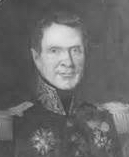General Jean François Boulart

Born: May 20, 1776
Place of Birth: Reims, Marne, France
Died: October 20, 1842
Place of Death: Besançon, France
Arc de Triomphe: BOULART on the west pillar
Pronunciation:
The son of a choir master of the cathedral of Reims, Jean François Boulart attended school in Reims until June of 1793 when he was accepted into the artillery school of Châlons-sur-Marne. A month later he was commissioned as a lieutenant in the 5th Foot Artillery at Strasbourg and he immediately began to serve with the Army of the Rhine. That October Boulart assisted in the loss of the lines of Wissembourg. His next major action did not come until November of 1794 when he served during the blockade of Mainz. In 1796 Boulart was promoted to capitaine and he served at the crossing of the Rhine at Kehl in June. Next he took command of the artillery reserve of the 1st Division of the Army of the Rhine.
1798 saw Boulart sent to the Army of Italy and then the Army of Rome. In early 1799 he helped to defend Fort Aquila against Neapolitan insurgents. That June Boulart fought at Modène and then the Trebbia before rejoining the Army of Italy in July. A month later he fought at Novi and then in September he returned to France to the garrison of the 4th Horse Artillery at Avignon. Boulart returned to Italy in April of 1800 where he took part in the defense of the line of the Var.
In 1801 Boulart was employed in the Army of the South and he accompanied General Dulauloy to Rome. That August he participated in the siege of Porto-Ferrajo under General Watrin, and then he returned to Italy, finally returning to France at the end of the year. In September of 1803 Boulart was assigned to the 5th Foot Artillery at Metz, where he would remain for a number of years.
Boulart returned to campaigning in 1806 and that July he was promoted to chef de bataillon and then in August he was ordered to join the Grande Armée. That September he joined the 3rd Horse Artillery and then in October two of the batteries of his regiment were attached to the Imperial Guard. Boulart assisted at the Battle of Jena that month and then in January of 1807 his unit was attached to Oudinot's elite grenadier division. The following month they fought at Ostrolenka, and then in March he was named a chef d'escadron in the Horse Artillery of the Imperial Guard. That June he served at the Battle of Friedland.
In March of 1808 Boulart was directed to travel to Spain where he took command of the artillery park of I Corps. In September he joined the foot artillery of the Imperial Guard before taking command of Ney's artillery and then being reassigned to the Imperial Guard by Napoleon. Sent back to France, Boulart caught up to the army during the Danube campaign in mid May of 1809, and he immediately saw action, fighting at Aspern-Essling where he was wounded by a ball to the heel. Boulart continued to serve and fought at Wagram where he was again wounded, this time being bruised by a ball. After the campaign, he returned to France and went to La Fère and the following year he was made a Baron of the Empire.
With the campaign in Russia looming in 1812, Boulart took command of the artillery of Curial's division in the Imperial Guard. Over the course of the campaign he fought at Smolensk , Borodino, and the Berezina. Once back in friendly territory, Boulart returned to Mainz where he was promoted to colonel and made director of the artillery park of the Imperial Guard. In June of 1813 he rejoined the army in Saxony and then in September he was made a Commander of the Legion of Honor. Boulart went on to fight at Leipzig and Hanau and a week afterwards he was promoted to général de brigade and given command of the regiment of foot artillery in the Imperial Guard. Serving during the defense of France in 1814, Boulart fought at La Rothière and Montereau in February.
After Napoleon's abdication in April, Boulart was named a Knight of Saint Louis but then put on non-activity. In February of 1815 he was named commander of the artillery school at Strasbourg, but when Napoleon returned from exile for the Hundred Days, Boulart rallied to Napoleon. Boulart was given command of the artillery of V Corps under General Rapp and that June he fought at the combat of Suffelweyersheim. After Napoleon's second abdication, Boulart was unemployed for a few months before resuming his post at the artillery school of Strasbourg in February of 1816. In 1830 he became commander of the artillery school of Bseançon.
Bibliography
- Divry, Arnauld. Les Noms Gravés sur l'Arc de Triomphe. Paris: L'Harmattan, 2017.
- Six, Georges. Dictionnaire Biographique des Généraux & Amiraux Français de la Révolution et de l'Empire (1792-1814). 2 vols. Paris: Gaston Saffroy, 2003.
Updated June 2024
© Nathan D. Jensen